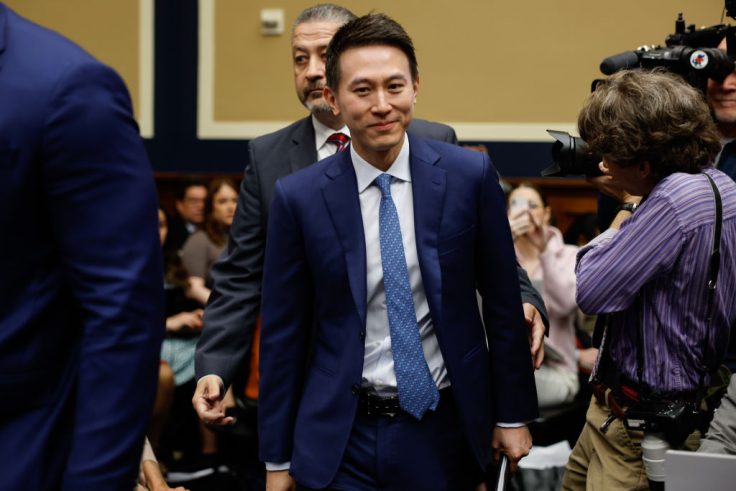Just weeks after TikTok's top executive faced a bipartisan firing squad on Capitol Hill, there is increased pessimism in the Beltway that any meaningful regulation of the Chinese-owned social media platform is on the horizon.
TikTok has been buoyed by high-priced lobbying campaign, congressional infighting, and a renewed embrace by President Joe Biden's White House, which has quickly gone from threatening a ban of the app to empowering the app's users. One senior Senate Republican staffer who has worked for several years on legislation to combat TikTok and other Chinese Communist Party-linked entities put it bluntly: "There's almost zero chance we'll see any action against TikTok in this Congress."
TikTok CEO Shou Zi Chew's rocky testimony before the House just weeks ago prompted agreement across the political spectrum that major regulatory changes were coming to the social media company following years of concerns over parent company ByteDance's ties to the Chinese Communist Party. Those concerns include questions about whether Beijing can access the data of its users and whether TikTok manipulates its feed to damage U.S. interests. But TikTok was prepared to fight back, mounting one of the largest lobbying campaigns in Washington, D.C.
TikTok spent at least $5.4 million on lobbying last year, with that number expected to increase in 2023. And last month TikTok hired the top Democratic lobbying firm SKDK, whose founding partner is a top adviser to President Joe Biden. TikTok's growing lobbyist army spans across the political spectrum and includes former Republican lawmakers such as Jeff Denham (Calif.).
Since Chew's hearing, TikTok's fortunes have reversed. The company has prominent lawmakers from both parties criticizing regulation of its product. Rep. Jamaal Bowman (D., N.Y.) called the push to ban TikTok an example of "xenophobia around China." TikTok scored another big win at the end of March, when Republican senator Rand Paul (Ky.) attacked Republican proposals to ban the app as an attack on the First Amendment.
Even after White House press secretary Karine Jean-Pierre said in March that TikTok "could endanger or threaten America's safety and … national security," Biden is reportedly giving TikTok influencers their own press briefing room in the lead-up to his reelection campaign.
Senior Senate staffers said any action surrounding the company would need to originate with bipartisan support in the upper chamber, in part because the House has yet to coalesce around a single piece of legislation targeting TikTok. But in the Senate, the only bill to receive bipartisan support has been criticized as toothless. A bipartisan group of 26 senators, led by Mark Warner (D., Va.) and John Thune (R., S.D.), has coalesced behind the RESTRICT Act, which would give federal regulators powers to ban foreign-owned applications such as TikTok.
Supporters say the law is an attempt to give legal authority for a president to ban TikTok, pointing to the Trump administration's unsuccessful 2020 attempt to ban the Chinese app by executive order. But the RESTRICT Act never names TikTok, which has actually signaled its support for the law. The bill instead broadly empowers the Commerce Department to prohibit any technology that "poses undue or unacceptable risk to national security"—a decision the law's authors say insulates it from legal challenges.
The bill prompted criticism from Republicans for failing to ban TikTok immediately. RESTRICT Act critics such as Sen. Marco Rubio (R., Fla.), who has his own bill to outlaw TikTok, argue that the act could delay action against the tech company for years and relies on Biden administration officials who have voiced apprehensions about a ban, such as Commerce Secretary Gina Raimondo, to pull the trigger.
"There is no time for half-measures," Rubio told the Washington Free Beacon.
Sen. J.D. Vance (R., Ohio), who supports a ban on TikTok, said last month that language in the RESTRICT Act is too broad. "You're creating, effectively, a PATRIOT Act for the digital age," Vance said.
The RESTRICT Act's supporters have also botched its rollout, with cosponsor Sen. Lindsey Graham (R., S.C.) revealing in a late March interview with Fox News that he was unfamiliar with the bill's provisions. According to a senior Senate Republican staffer, the botched rollout means that "anti-TikTok legislation is currently dead." Another senior Senate aide, who worked on the RESTRICT Act, pushed back against that characterization, saying that no other bill "has this broad base of bipartisan support."
"President Biden has endorsed the bill. And more than two dozen Republicans and Democrats in the Senate support it," the individual said. "A coordinated campaign based on fear and misinformation can't change those facts."
A blanket ban does not appear to have any life in the Senate after Paul blocked an effort by Sen. Josh Hawley (R., Mo.) to fast-track a ban. Paul said a ban would be an electoral nightmare for Republicans, citing TikTok's popularity with young voters.
Meanwhile, the White House is leaning into using TikTok and similar apps as it gears up for 2024, raising questions about whether it sincerely views the company as a national security threat. Biden's campaign plans to "lean on hundreds of social media 'influencers' who will tout Biden's record," according to a recent report. As Chew was testifying to Congress in March, the White House used an app owned by TikTok's parent company to make an Instagram video.
"Biden could take action against TikTok tomorrow if he wanted to but keeps punting," said a senior Senate aide, referring to the White House's long-delayed security review of the app. "It just seems like a no-brainer."
TikTok did not respond to a request for comment.
Update April 12, 10:51 a.m.: This piece was updated with more information on the RESTRICT Act.
